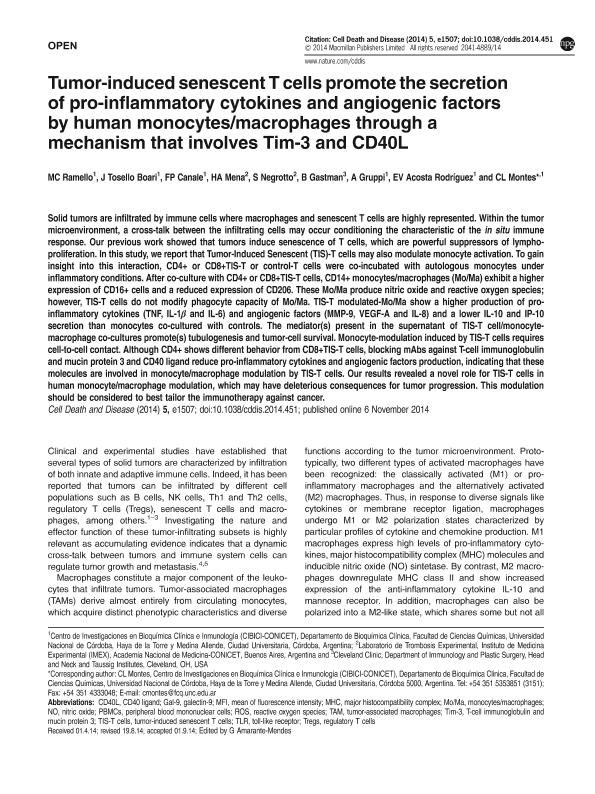Mostrar el registro sencillo del ítem
dc.contributor.author
Ramello, María Cecilia

dc.contributor.author
Tosello Boari, Jimena

dc.contributor.author
Canale, Fernando Pablo

dc.contributor.author
Mena, Hebe Agustina

dc.contributor.author
Negrotto, Soledad

dc.contributor.author
Gastman, B
dc.contributor.author
Gruppi, Adriana

dc.contributor.author
Acosta Rodriguez, Eva Virginia

dc.contributor.author
Montes, Carolina Lucia

dc.date.available
2018-01-02T18:50:02Z
dc.date.issued
2014-11
dc.identifier.citation
Montes, Carolina Lucia; Acosta Rodriguez, Eva Virginia; Gruppi, Adriana; Gastman, B; Negrotto, Soledad; Mena, Hebe Agustina; et al.; Tumor-induced senescent T cells promote the secretion of pro-inflammatory cytokines and angiogenic factors by human monocytes/macrophages through a mechanism that involves Tim-3 and CD40L; Nature Publishing Group; Cell Death and Disease; 5; 11-2014; 1-9
dc.identifier.issn
2041-4889
dc.identifier.uri
http://hdl.handle.net/11336/32023
dc.description.abstract
Solid tumors are infiltrated by immune cells where macrophages and senescent T cells are highly represented. Within the tumor microenvironment, a cross-talk between the infiltrating cells may occur conditioning the characteristic of the in situ immune response. Our previous work showed that tumors induce senescence of T cells, which are powerful suppressors of lympho-proliferation. In this study, we report that Tumor-Induced Senescent (TIS)-T cells may also modulate monocyte activation. To gain insight into this interaction, CD4+ or CD8+TIS-T or control-T cells were co-incubated with autologous monocytes under inflammatory conditions. After co-culture with CD4+ or CD8+TIS-T cells, CD14+ monocytes/macrophages (Mo/Ma) exhibit a higher expression of CD16+ cells and a reduced expression of CD206. These Mo/Ma produce nitric oxide and reactive oxygen species; however, TIS-T cells do not modify phagocyte capacity of Mo/Ma. TIS-T modulated-Mo/Ma show a higher production of pro-inflammatory cytokines (TNF, IL-1β and IL-6) and angiogenic factors (MMP-9, VEGF-A and IL-8) and a lower IL-10 and IP-10 secretion than monocytes co-cultured with controls. The mediator(s) present in the supernatant of TIS-T cell/monocyte-macrophage co-cultures promote(s) tubulogenesis and tumor-cell survival. Monocyte-modulation induced by TIS-T cells requires cell-to-cell contact. Although CD4+ shows different behavior from CD8+TIS-T cells, blocking mAbs against T-cell immunoglobulin and mucin protein 3 and CD40 ligand reduce pro-inflammatory cytokines and angiogenic factors production, indicating that these molecules are involved in monocyte/macrophage modulation by TIS-T cells. Our results revealed a novel role for TIS-T cells in human monocyte/macrophage modulation, which may have deleterious consequences for tumor progression. This modulation should be considered to best tailor the immunotherapy against cancer.
dc.format
application/pdf
dc.language.iso
eng
dc.publisher
Nature Publishing Group

dc.rights
info:eu-repo/semantics/openAccess
dc.rights.uri
https://creativecommons.org/licenses/by-nc-sa/2.5/ar/
dc.subject
Cancer
dc.subject
Cell Signalling
dc.subject
Inflammation
dc.subject
T Cells
dc.subject.classification
Otras Ciencias Biológicas

dc.subject.classification
Ciencias Biológicas

dc.subject.classification
CIENCIAS NATURALES Y EXACTAS

dc.title
Tumor-induced senescent T cells promote the secretion of pro-inflammatory cytokines and angiogenic factors by human monocytes/macrophages through a mechanism that involves Tim-3 and CD40L
dc.type
info:eu-repo/semantics/article
dc.type
info:ar-repo/semantics/artículo
dc.type
info:eu-repo/semantics/publishedVersion
dc.date.updated
2017-12-28T17:47:45Z
dc.journal.volume
5
dc.journal.pagination
1-9
dc.journal.pais
Reino Unido

dc.journal.ciudad
London
dc.description.fil
Fil: Ramello, María Cecilia. Consejo Nacional de Investigaciones Científicas y Técnicas. Centro Científico Tecnológico Córdoba. Centro de Investigaciones en Bioquímica Clínica e Inmunología; Argentina
dc.description.fil
Fil: Tosello Boari, Jimena. Consejo Nacional de Investigaciones Científicas y Técnicas. Centro Científico Tecnológico Córdoba. Centro de Investigaciones en Bioquímica Clínica e Inmunología; Argentina
dc.description.fil
Fil: Canale, Fernando Pablo. Consejo Nacional de Investigaciones Científicas y Técnicas. Centro Científico Tecnológico Córdoba. Centro de Investigaciones en Bioquímica Clínica e Inmunología; Argentina
dc.description.fil
Fil: Mena, Hebe Agustina. Consejo Nacional de Investigaciones Científicas y Técnicas. Instituto de Medicina Experimental. Academia Nacional de Medicina de Buenos Aires. Instituto de Medicina Experimental; Argentina
dc.description.fil
Fil: Negrotto, Soledad. Consejo Nacional de Investigaciones Científicas y Técnicas. Instituto de Medicina Experimental. Academia Nacional de Medicina de Buenos Aires. Instituto de Medicina Experimental; Argentina
dc.description.fil
Fil: Gastman, B. Cleveland Clinic; Estados Unidos
dc.description.fil
Fil: Gruppi, Adriana. Consejo Nacional de Investigaciones Científicas y Técnicas. Centro Científico Tecnológico Córdoba. Centro de Investigaciones en Bioquímica Clínica e Inmunología; Argentina
dc.description.fil
Fil: Acosta Rodriguez, Eva Virginia. Consejo Nacional de Investigaciones Científicas y Técnicas. Centro Científico Tecnológico Córdoba. Centro de Investigaciones en Bioquímica Clínica e Inmunología; Argentina
dc.description.fil
Fil: Montes, Carolina Lucia. Consejo Nacional de Investigaciones Científicas y Técnicas. Centro Científico Tecnológico Córdoba. Centro de Investigaciones en Bioquímica Clínica e Inmunología; Argentina
dc.journal.title
Cell Death and Disease
dc.relation.alternativeid
info:eu-repo/semantics/altIdentifier/doi/http://dx.doi.org/10.1038/cddis.2014.451
dc.relation.alternativeid
info:eu-repo/semantics/altIdentifier/url/https://www.nature.com/articles/cddis2014451
Archivos asociados
